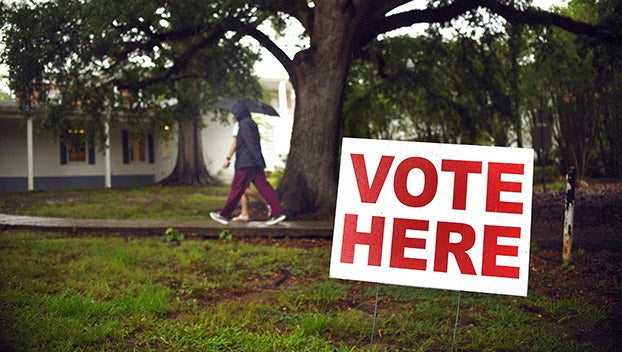Sheriff: Judges must consider risk to public when setting bonds
Published 12:46 am Sunday, February 26, 2017
NATCHEZ — After a man with a reported history of violence against law enforcement was released on a $1,000 bond, Adams County Sheriff Travis Patten took his concerns to an Adams County Justice Court judge.
While Patten said people have a right to make bond, the sheriff said judges also must consider the risk to the public.
“Moving forward, I think we are on the same page when it comes to eliminating crime,” Patten said. “Fortunately, lives were not lost in the case. It is one to learn from.”
Justice Court Judge Hyde Carby, who was appointed to replace Judge Charlie Vess until a special election, set a bond of $1,000 for Russell Bryon Hazlip, 38, 3 Maplewood Lane. On Feb. 10, Hazlip was charged with aggravated assault on a law enforcement officer and disorderly conduct.
On Feb. 18, deputies attempted to capture Hazlip for a bond revocation hearing. Hazlip reportedly got in his car and tried to leave his residence when deputies attempted to serve the warrant.
Hazlip allegedly cut through a nearby lawn, rammed a deputy’s vehicle and continued to drive through lawns before getting stuck in a ditch.
Hazlip reportedly exited the vehicle with a loaded gun in his hand and deputies were able to apprehend him after he allegedly resisted arrest.
He was charged with two counts aggravated assault on a law enforcement officer, felony fleeing in a motor vehicle and resisting arrest.
On Thursday, Circuit Court Judge Forrest “Al” Johnson ordered Hazlip be held without bond as Hazlip’s defense attorney Kevin Colbert waived the hearing.
Carby said he was prohibited from making a public comment on a pending case.
Hazlip reportedly has a history of using violence against Adams County Sheriff’s Office deputies.
In Sept. 2016, Hazlip allegedly almost ran a deputy over with a truck while the deputy was investigating a stolen motorcycle on the side of Liberty Road. Hazlip fled from deputies and was arrested later.
Hazlip was charged at that time with aggravated assault on a law enforcement officer, disorderly conduct and receiving stolen property.
Patten said he had the utmost respect for Judge Carby, and said he understood Carby’s duty to be fair to both the victims and the accused.
“It is really a balancing act,” Patten said. “The judge has to be fair and impartial. As a sheriff, we have to be the same way.”
Former Adams County Sheriff Tommy Ferrell said bonds are an important tool for law enforcement in protecting the community. Ferrell, who once served as the president of the National Sheriff’s Association, said the accused are innocent until proven guilty, but if judges would stick to bond schedules, then law enforcement would not be faced with surprises.
“We have so many different judges and each one handles it differently,” Ferrell said. “Low bonds have been a law enforcement concern for years.”
Ferrell said if judges stuck to a schedule, then at least bonds set would be fair.
“Officers would know what the bonds would be, instead of them being all over the scale,” Ferrell said. “It would make everyone’s job much easier and would protect law enforcement and protect the citizens, which is mainly what it is for.”
Vess, a retired Justice Court Judge, said in the purest sense, a bond is to ensure a person will come back to court for hearings or trials. Depending on the serious of the felony charge, Vess said bail could get pretty high, $500,000 and even $1 million.
If another crime is committed, or cause exists to believe another crime will be committed, Vess said a person could also be held without bail.
Vess said bail for someone charged with convicted felon in possession a firearm was something he always carefully considered.
“That was a red flag for me that I should look at bail fairly closely,” Vess said. “ Before granting a bail — it is not to punish in the constitution — but you have to look at the entire picture.
“Dangerous people should not be let out, especially multiple, repeat offenders, without stringent conditions.”





